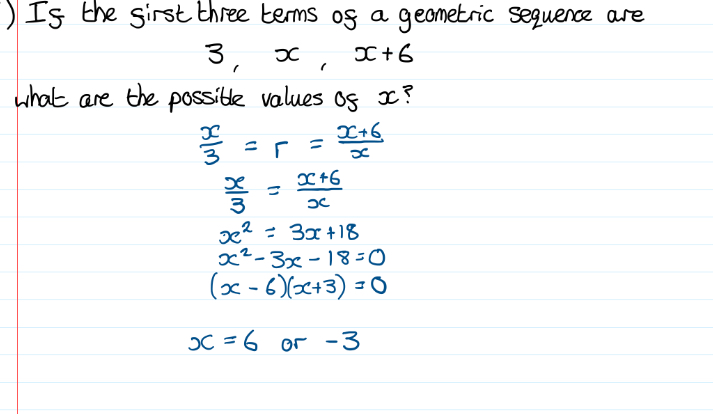Arithmetic and geometric sequences
1/19
There's no tags or description
Looks like no tags are added yet.
Name | Mastery | Learn | Test | Matching | Spaced | Call with Kai |
|---|
No analytics yet
Send a link to your students to track their progress
20 Terms
What is an arithmetic sequence?
The difference between consecutive terms are constant
What are arithmetic sequences also sometimes known as?
Arithmetic progressions
What is the nth term for an arithmetic sequence?
Un= a + (n-1)d
What is a?
The first term
What is Un?
The nth term
What is n?
The term
What is d?
The common difference
What is a geometric sequence?
Sequence that has a common ratio between consecutive terms
What is a geometric sequence sometimes also known as?
Geometric progression
What happens with a geometric sequence that has a common ratio IrI <1
It converges- tends to a certain value which is the limit of the sequence
What is an alternating sequence?
A sequence in which terms are alternately positive and negative
What is the nth term for a geometric sequence?
Un= ar to the power of n-1
What is a?
The first term
What is r?
The common ratio
How would you find the first term in a sequence that is negative?
Set Un< 0
How could you calculate the common ratio between consecutive terms in a geometric sequence?
Using U2/U1 = U3/U2
How would you show a number using a sequence?
eg: is 1071 in this sequence?
Work out the nth term
Put the nth term equal to the number (eg 1071)
Rearrange to calculate n, if n is an integer it is in the sequence

How do you calculate how many terms are in a sequence?
Work out the nth term
Put the last number equal to the nth term
Rearrange to calculate n
How do you calculate what is the first term to exceed a number?
Work out the the nth term
Set the nth term as > the number
Rearrange to have n >
If you are given the first three terms of a geometric sequence algebraically, how do you calculate the values?
Calculate the common ratio using U2/U1 = U3/U2
Then, multiply both sides by the denominators
Then solve quadratic
